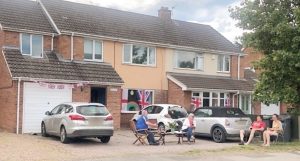A Reflection Upon Our Own Social History
By Samantha Ann Rose Brinded
MA Postgraduate
On Friday 08 May 2020, the country celebrated VE Day, as it has done for the past 75 years. However, this year was a little different. My previous experience of VE Day celebrations consisted of seeing a few flags decorating a few windows and, more recently, posts being shared over social media. This year, at least every other house had some form of flag or bunting and, for the first time, my road had a street party. Of course, we were not the only street to do so, up and down the country people took to their front gardens, eating cakes, listening to music and chatting to their neighbours. Whilst sipping on my own cup of tea, Vera Lynn playing on Spotify, I wondered why we had suddenly all become so patriotic? Was it because it had been 75 years since that first celebration? Or was it because for the last two months we’d been living in a seemingly isolated society and this was a chance for us to come together? In a previous post, I wrote about Lincoln celebrating RAF 100 with its annual 1940’s weekend. I argued that these events were about more than nostalgia, more than remembering the sacrifices that had been made, but also about commemorating a time when communities came and worked together. I think it is that idea that brought everyone out that sunny Friday.
Despite social distancing, our street came together in a way it had never done before. One of our neighbours told us how he had lived in his house for three decades and had never seen so many of us. My own family have lived here for the same amount of time and were surprised to say the same. As a student of history, it is easy to get caught up in the past lives of others and forget that your very own present may one day be the focus of some undergraduate dissertation, some future professor’s book. In researching my own thesis, I spend most my days trawling through the diary entries and thoughts of a previous generation. Of moments that to them may have seemed inconsequential but to us, help to create a picture of the ordinary life and tell a story that might otherwise have been lost. Today, in an age of social media, we are anything but voiceless and yet, if it doesn’t involve a cat, a well-photographed plate of food or a satirical comment, it might not be recorded. Though this was not an average day of ‘quarantined Britain’, it was a day in which some spirits were lifted, when, in a world of Trump and Brexit, we could all get together behind a form of patriotism that united rather divided.
I reflected upon this as I sat with my parents, talking to our neighbours about the queues at Asda, what’s for tea and where we should have been going on holiday. As the young family who had arranged the event walked past, handing out homemade cakes (from a safe distance, of course). As cars drove by, beeping and waving at every house with people stood outside. I thought how this moment should be written down, so we, and perhaps future generations, could look back at this unique point of quarantine. A time of social distancing but not quite.
Further information:
My previous post on Lincoln’s RAF 100/1940’s weekend: https://history.lincoln.ac.uk/2018/09/16/lincolns-raf-100-1940s-weekend/
If you’re interested in recording your own ‘ordinary life’, please visit:
http://www.massobs.org.uk/
Photo: Author’s Own

